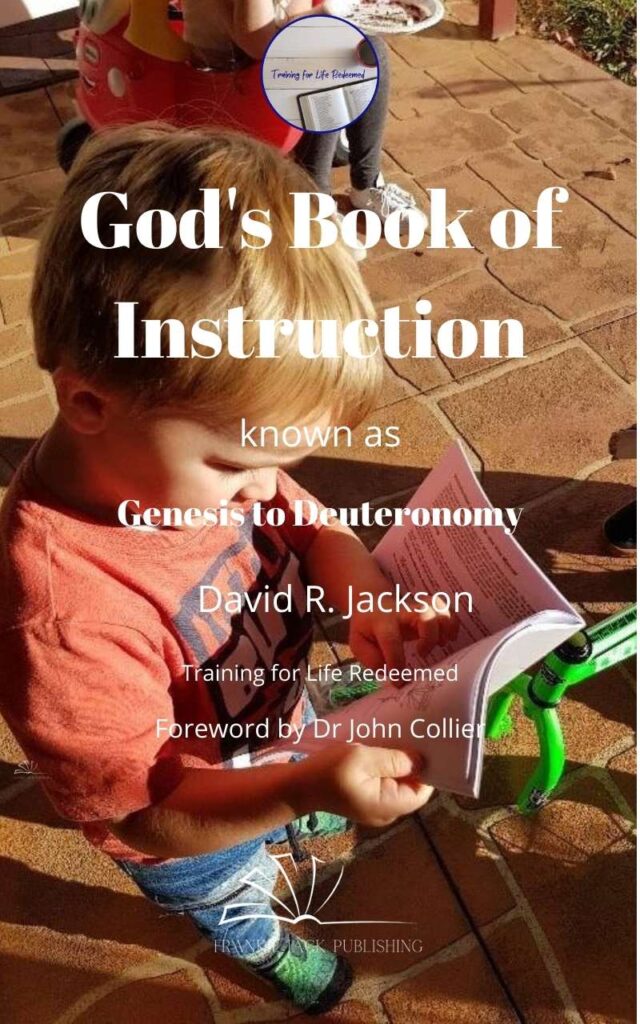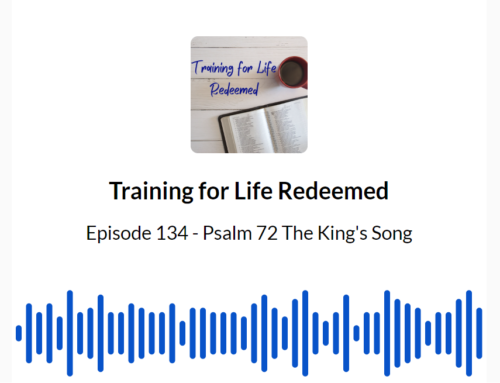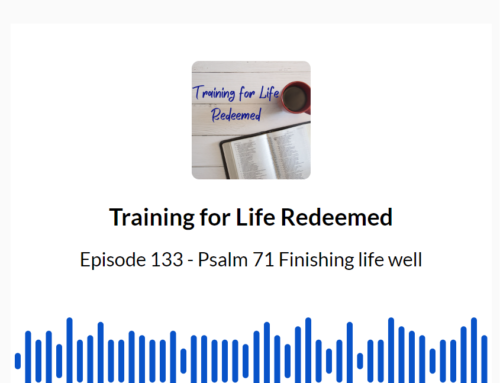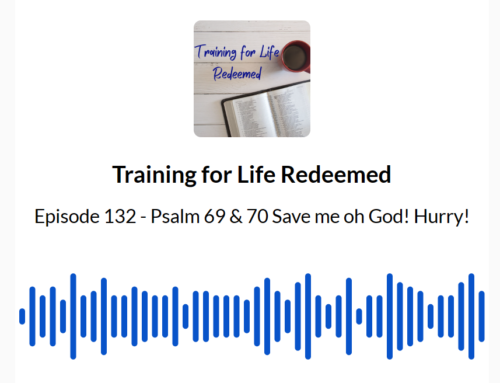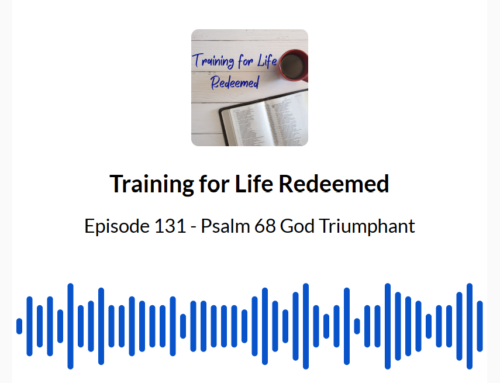Grab your notes for this episode by completing the form
and we will send you the link to all our notes.
Get the book “God’s Book of Instruction” on Amazon.
The first five books of the Old Testament constitute God’s book of instructions for his redeemed people. It reveals the character of God and his good design for life. It bears witness to the beginning of his work of redemption. It equips the believer to live in God’s world, God’s way, as God’s image for God’s glory. What sin and death have broken, God’s people can rebuild by keeping to his instructions by the power of his presence with us.
Transcript
Dan: (00:01)
Hi everyone. And welcome to episode six. I’m Dan, I’m your host. And I’m here again with my father David Jackson. And in this episode, we’re going to be looking at humanity’s second attempt to get life right. Following the flood
Dan: (00:24)
So we are reading from Genesis six, verse nine through to chapter eleven, verse nine. So quite a big chunk again, but that’s good. We’re going to get a nice chunk of information out and answer a few questions here so that this must be one of the best known events in the Bible of the flood. I think I’ve seen every kid’s book I’ve ever seen. I get that humanity was sinful and wicked, but how did Noah and his family get to be the ones God saved? I mean, it says in Genesis six, nine, that he was righteous and blameless, did he never sin?
David: (01:07)
Yeah. You might get that impression if we just started reading at nine, but in verse eight it says, Noah found grace in the eyes of Yahweh. So the grace comes before the judgment that is blameless and righteous. And this, this is the model for the rest of the gospel. Here is a man like every other man, in a screwed up world, living life, going nowhere. And the word grace, literally the Hebrew word is khen and it literally means “without cause.” And what it’s saying there is, there’s absolutely nothing about Noah that caused God to pick him. It’s not like God chose him out of some random, out of some shortlist. He didn’t look into his crystal ball and see what a good fellow Noah would turn out to be and choose him. He wrote Noah into the story that he is creating to glorify his name.
David: (02:07)
And that’s a very humbling discovery. We find out later on when we’re reading the new Testament, Paul says these words “you’ve been saved by grace through faith. You didn’t save yourself. The gift of God, isn’t the result of work so that no one boasts we are his work.” And this is the thing that I think really clinches it for us “created in Christ Jesus for good works that God prepared beforehand so that we’d walk in them.” And one of the great discoveries we have in all of this is that everything that’s happening is going according to God’s plan. And God has written these people into that plan. So Noah is a person God created to have this role in bringing about the next stage of his plan of redemption. That’s what gives our lives significance. We are part of a much bigger story and God’s it’s God’s story later on, we find out in the book of Hebrews that Noah was blameless and righteous because he trusted God’s promise to save.
David: (03:15)
So God has written him into the story. Noah is a man who for no other reason than it’s God’s plan. God saves him. He’s born again. He believes God declares him righteous and blameless because Jesus will cover all of his sin. Noah’s putting his faith in the promise of a saviour. We put our faith in the promise kept, but it’s the same saviour and salvation works exactly the same way. So here we are. We have a man who is blameless and righteous before God. It doesn’t mean he didn’t sin. When I was teaching at school, I used to like to rattle the cage a little bit. And occasionally I’d tell the kids, I want you to go home and tell your parents that your Bible teacher is a Saint that I am perfect. And the kids would immediately go into. Oh no you’re not, and tell me what a wicked person I was. And my answer is, I’m not talking about how I behave. I’m talking about God’s judgement in God’s courtroom. I am blameless and innocent and righteous because Jesus paid it all. Whether I behave like that or not, it’s still a done deal because it’s not about what I do. It’s about what he did. And we had some really good discussions out of that. Noah is a brilliant example of this.
Dan: (04:41)
All right. Now what about children’s books? Children’s books have this beautiful kind of picturesque image of the flood, where you’ve got these cute little boats floating on water with rainbows and birds and drafts heads and elephants noses sticking out windows or out the top of the actual boat. Is that what it’s like? Is it a cute little bedtime story? Is that how it happens?
David: (05:03)
Yeah, I think children’s, we don’t like traumatizing children and that’s, that’s a good thing. But by the same token, I think sometimes we give children the wrong impression about this flood. We talk about post-traumatic stress syndrome these days, and that happens when you see the image of God damaged in a road accident. On the side of the street, we’ll have people, extraordinarily upset, nightmares all the rest of it. So let’s put this flood in perspective. We’re talking about drowning every living thing to the horizon and eight people in a box surviving with a bunch of animals it’s you can’t imagine what they would have seen. I look at it and I think the smell on getting out of that box would have been astonishing. This is not a cute bedtime story. This is just a sample of God’s judgment on sin. Noah isn’t in a boat, he’s in a box.
David: (06:11)
It’s what is it? 150 meters, long, 25 meters wide, 15 meters high. And if you want to picture that, what’s that one and a half football fields long. Yeah. About half a football field wide and high as the goalposts. And it’s a square box and a friend of mine, who’s a Marine bio Marine engineer tells me that that is the best design for something that would not tip over out at sea. It’s a barge. And this thing is going to land on the top of the Urartu mountain range. There Urartu mountain ranges over 5,000 meters above sea level. This was a huge event. I’ll tell you this story. It’s not in the notes, but, when your mother and I were back in Vancouver, Pat comes from Vancouver. She took me to the, native Indian museum. And we had a look at all their totem poles.
David: (07:10)
And I was just gobsmacked. As one of the people there told us the story of the native American totem pole. They don’t have a written language. So they tell their stories in these carvings and the story is that a long time ago, there was a great flood and everybody got swept away in the flood except this one fellow and his family. And they got rescued, by a killer whale. And they’re all climbing on the back of the killer whale and various animals are climbing on. And, uh, the killer whale is looking for land to dump his passengers. And he can’t find land until the Raven comes along and a raven and the killer whale have a bit of a chat. And the Raven flies off and leads the killer whale to dry land and life starts again. We know the Raven as the Thunderbird on the top of the pole. And if you look at those totem poles, there’s a killer whale with a little bloke sitting on his head. This is, this is a cultural memory of the flood. You can find similar stories in China dating back to 2000 BC. This really happened. It’s huge. And at the end of it, God saves humanity and we get a second go.
Dan: (08:16)
The idea of the flood was meant to be punishment for sin getting rid of sin kind of a judgment thing, but it’s not long after the flood. We then have more sin. We have Babel. So what was the point of the flood? If it doesn’t actually eliminate sin?
David: (08:32)
Yeah. You sort of wonder it’s not long after you get out of the box, mind you, that was a year and 10 days later, it wasn’t a 40 day flood. It lasted for a year and a bit, and they’re coming out of it into a destroyed world to set up a new life. And by the time we’d get around to down through chapter nine, you know, Noah has up his farm, he’s grown vintage grapes. His children are having kids. Things have quite moved on. We lose track of time. As we read through these narratives. And I immediately, you know, his kids, aren’t doing the right thing and the family is already beginning to fall apart. So what was the point. When you read later on in the Bible, in the book of numbers, it tells us that if you want to purify something, that there are two ways to do it.
David: (09:24)
If it’s strong enough to pass through the fire, you put it through the fire and that’ll sterilise it. If it’s not strong enough to go through the fire, you have to wash it. This first that this flood was for things that will not pass through the fire. God has basically given us a rehearsal of judgement day. This, this is the, you know, at school you’d say to a kid or a parent might say to a kid, all right, I’m going to give you a warning this time. Next time, you know, you cop the full consequence. Usually when we do that, nothing happens because we’re pretty wimpy about our warnings. When God gives a warning, this is what it looks like. He’s cleansed the earth with water. It’s like he baptised the whole planet, but the next time round we’re told in the New Testament that all of the elements will be converted to pure heat. It’s going to be a baptism of fire. And so this is our warning, and I don’t think we’re listening adequately.
Dan: (10:32)
So after, you know, there’s, there’s some sinning there, then the tower of Babel happens. Now what’s actually going on with the tower of Babel. How is their sin involved with this? So in one sense, they’re just kind of building a really big tower. Maybe they’re trying to get to heaven, but I’m not convinced that’s quite what they’re trying to do. What, what’s your, what are you gonna give us on that in terms of what’s what’s the actual sin here?
David: (10:58)
I think the sin here is the attempt to save themselves from God’s curse on sin. So God has declared that the penalty for sin is death. Death is separation, not annihilation. And we’ve already seen that, everything’s falling apart. People are scattering separating, broken relationships, exile, you name it. So these people have realized, well, gee whiz, we don’t want that to happen to us. We just got out of the box. We’re setting up a whole new humanity. Let’s make sure we don’t break up and separate and fall apart. We want to fix all of the stuff that our sin has brought on us, by our own wisdom. So here you are in the middle of a big featureless plain between the Tigris and Euphrates river. You can’t even make a map of the place because there’s no features to put on the map.
David: (11:52)
So we’re going to build tower. If we build a tower that is as high as heaven, that’s a description of it. Then we’ll have a reference point. We can lay out our farms. We can build our city. We can have a name on it. It’ll be something that’ll outlast us. People will remember us. We’ll be a, somebody, not a nobody. And we won’t be scattered all over the face of the earth. We can hang together. And God, there’s no way God is going to put up with us, saving ourselves from the consequences of what we’ve done. So he’s going to come down there that in future towers that people built in the Ancient Near East, they built these towers to go up to a high place in the hope that their gods would come down and listen to them on this occasion, God came down and when he came down, he brought down the judgement on any attempt we might make to save ourselves. It ain’t going to work. The characteristic of our sin is that we divide and scatter.
Dan: (12:55)
All right? So the flood was a warning of God’s final judgment, or that demonstration of how God saves people. If things were bad before the flood, they are certainly a lot worse now, for sure, you have to wonder why God doesn’t bring down this final judgment really, and put an end to all of it. But Peter tells us that he’s holding off to give people the opportunity to turn to Christ and be saved. You can find that in two Peter, 3:10. well, that’s it. For this episode, please come over and grab the show notes for this episode. This is episode six. So you come to training for life, redeemed.com/six. You can grab the show notes. You can also grab the PDF of the full study that goes with these passages for you to use for your own personal study or to use with a Bible study group. If you would like, or if you’re a teacher, you could use it with your students even at school. But please come back and listen to us next week. We hope you will join us as we go looking at how God gave Abraham a life that became a blessing to the whole world. So thank you so much for joining us. And I hope that you will hit that subscribe button and we’ll see you next week.
